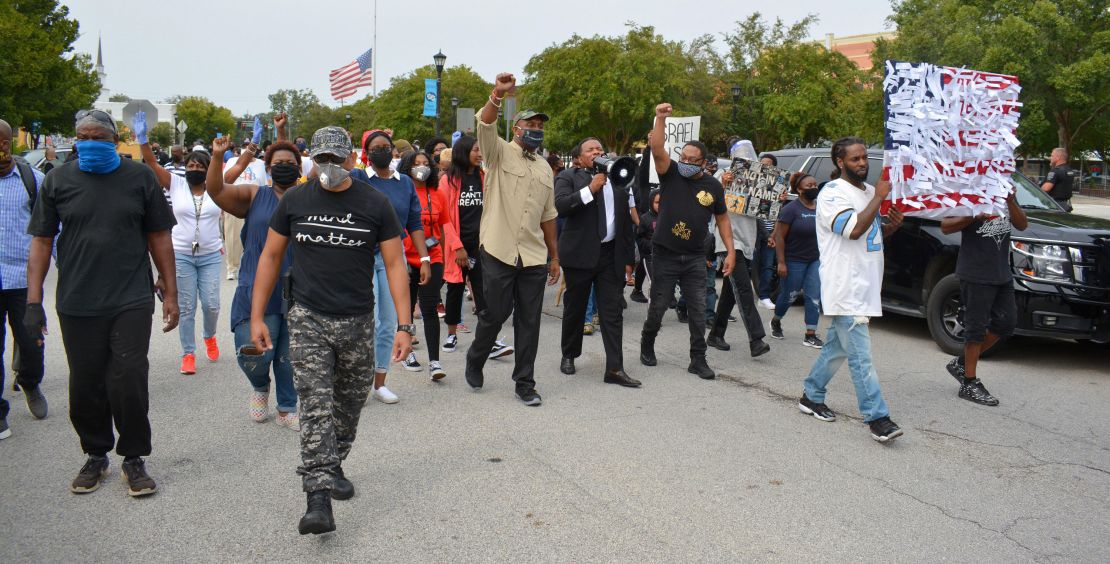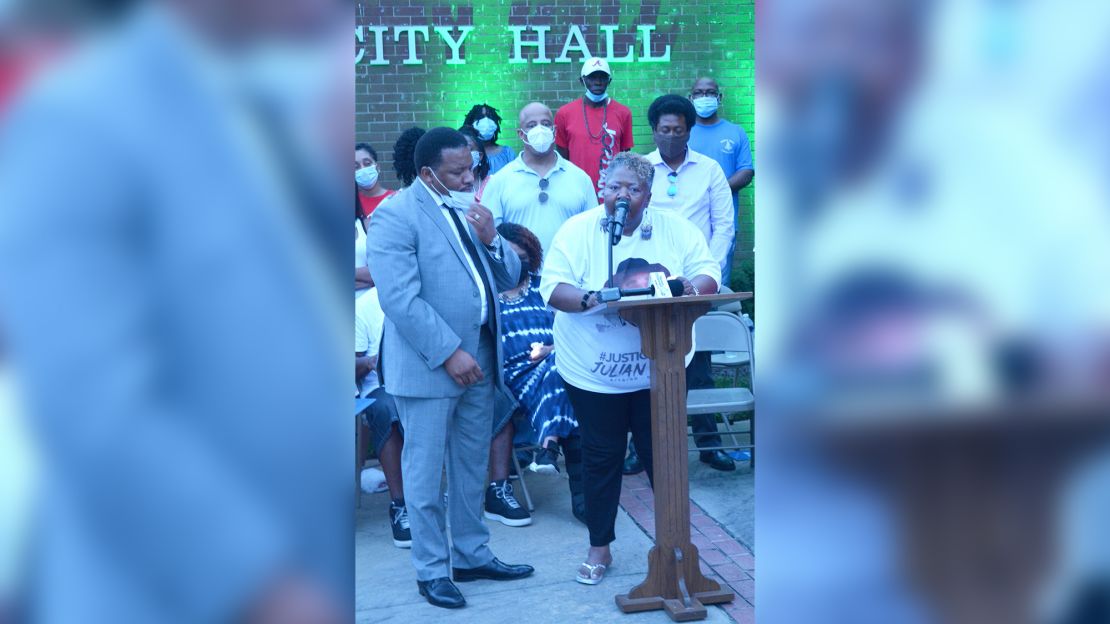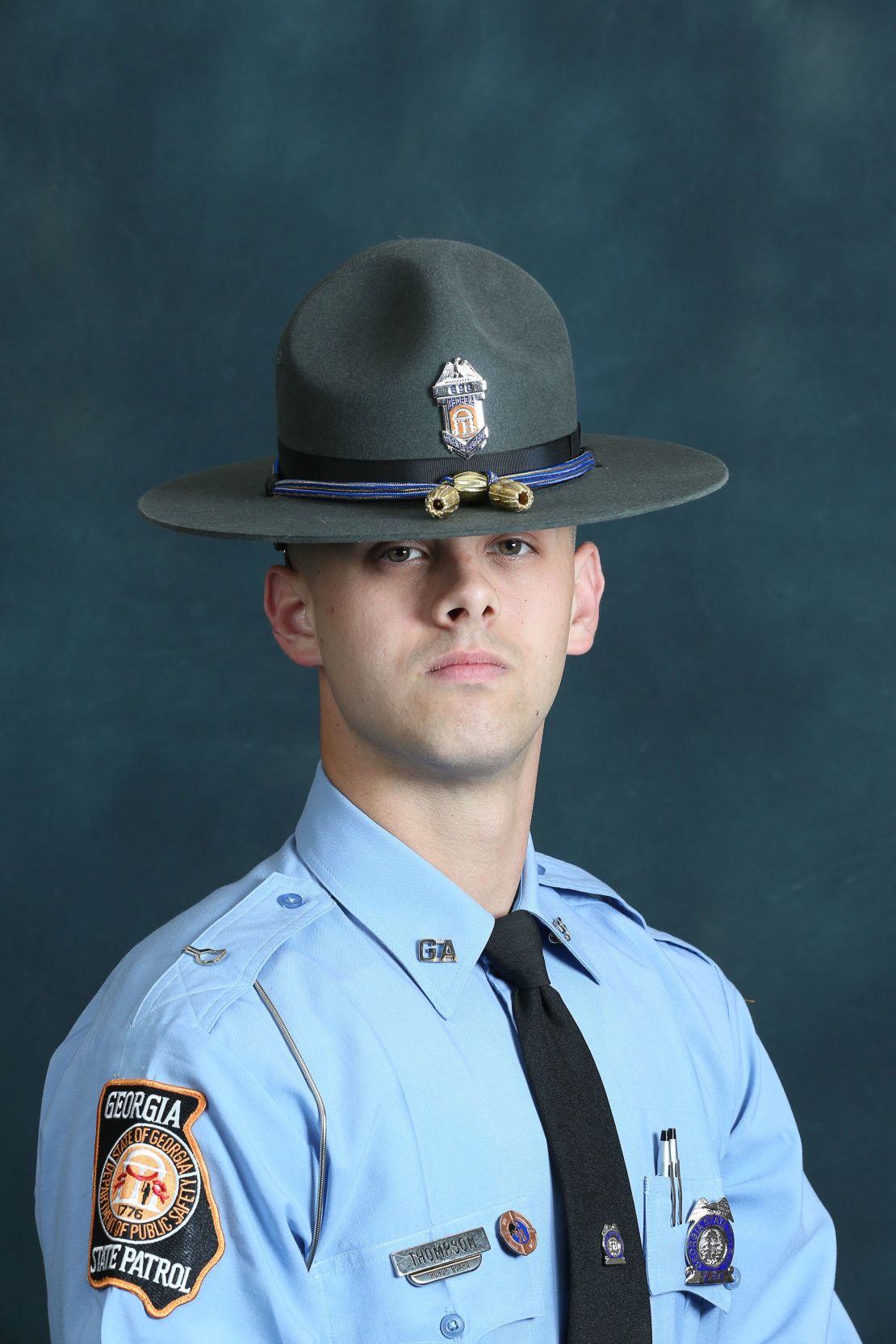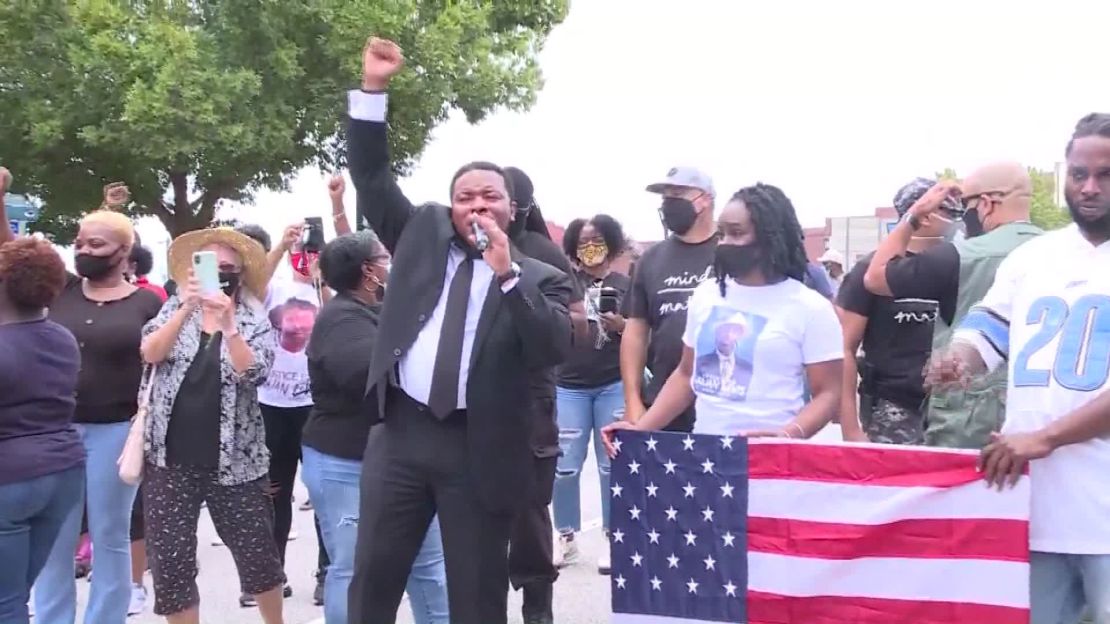As a Georgia state trooper, Jacob Thompson impressed his bosses. They praised him for setting records in his unit for traffic stops and DUI busts. They commended his dedication to serving on the agency’s honor guard. And they noted that in his off hours he raised money for a children’s hospital and worked as a volunteer firefighter.
So representative of the sort of trooper the agency coveted, Thompson was pictured on recruitment brochures. Just last year, he was given a “Trooper Of The Year” award.
But these days, Thompson’s once bright career seems unreconcilable with where he is now: Stripped of his badge and sitting in a county jail awaiting trial for felony murder.
On August 7, Thompson shot and killed Julian Lewis, a 60-year-old Black man, following a chase in the quiet town of Sylvania. He was fired a week later.
The shooting quickly thrust this small slice of Georgia into the national spotlight, with some, including the Lewis family attorney, comparing his death to those of George Floyd and Eric Garner. Yet, more than a month on, national attention on this case has dimmed. With the dashcam video and other evidence withheld by state investigators and no known bystander video, the public outcry over Lewis’s death was short-lived.
Despite the lack of details released about the shooting, interviews, transcripts and documents obtained by CNN offer a glimpse into Thompson’s seven-year career as a trooper and clues into how a chase along east Georgia’s country roads left one man dead and another behind bars.

The night of the shooting, and the ‘ugliest kind of lie’
It began with a broken taillight.
Thompson told investigators that’s why he tried to pull Lewis over that night, but Lewis kept driving, turned on his hazard lights and made some hand signals to Thompson before heading down a couple of country roads.
Lewis lit a cigarette as he drove. An unopened beer sat in the console. At the time, Lewis was on parole for driving impaired, records show, due to end in late August.
As they sped along, Thompson decided to ram Lewis’s car, performing what’s known as a PIT maneuver – a technique allowed if a trooper believes stopping a chase is in the interest of public safety. Lewis’s car spun out and stopped in a ditch.
Thompson parked his patrol vehicle “approximately even” with Lewis’s car and drew his weapon as he stepped out, he wrote in an incident report.
“At some point, I heard the engine on the violator’s vehicle revving at a high rate of speed,” Thompson said, noting that he activated the light on his gun.
Lewis had “both hands on the steering wheel” and was wrenching it “in an aggressive back and forth manner towards me and my patrol vehicle,” the trooper wrote. “It appeared to me that the violator was trying to use his vehicle to injure me.”
He fired his gun once, he said, then peered inside the car and realized he’d shot Lewis in the forehead.
But Thompson’s account is contrary to what evidence and dashcam video shows happened, GBI agent Dustin Peak testified at the trooper’s August 24 bond hearing.
The video reveals, “approximately one second after Mr. Thompson’s foot came off the brake and the vehicle went into park, the shot – one shot was fired,” Peak said.
Peak also noted that the crash left Lewis’s car inoperable and its wheels facing away from Thompson’s vehicle.
Lewis’s vehicle was a front-wheel-drive car, Peak said, and the driver’s side was resting in soft sand, which would have kicked up if the tire had spun. “There’s no indication that the front tire ever rotated,” the agent said.
Asked by prosecutor J. Barclay Black whether Lewis’s car posed a threat to Thompson that justified deadly force, Peak replied, “No, sir.”
There were no witnesses to the shooting, Peak added.
While searching the car, agents did not find any firearms or drugs, the agent testified. Apart from the unopened beer can, investigators recovered Lewis’s cell phone in the driver’s side pocket.
A GBI toxicology report completed a couple weeks after Peak’s testimony would show Lewis had cocaine, methamphetamine and the prescription anti-depressant fluoxetine in his system.
Defense attorney Robert Persse suggested that Thompson was so traumatized after killing Lewis that he couldn’t accurately remember the moments around the shooting.
Peak conceded, “I’m sure it’s possible.”
Julian Lewis’s widow, Betty, took the stand at the bond hearing, telling the judge that Thompson’s characterization of her husband as threatening is “the ugliest kind of lie” when it comes to Black people and police. “It plays on the stereotypes that Black men are violent,” she said.
The judge denied bond for Thompson, who was arrested on felony murder and aggravated assault charges. He has not entered a plea.
The defense team plans to look into whether the car was actually inoperable, Persse told CNN, declining to comment further. Black declined to comment for the story.

Betty Lewis told CNN her husband “wasn’t a violent” man, and that she believes he wasn’t fleeing at all. He was probably trying to reach a well-lit spot at an uncle’s home nearby, she said.
Lewis likely kept driving for the same reason people of color fear being stopped by law enforcement and sometimes don’t stop, said family attorney Francys Johnson, the former head of Georgia’s NAACP chapter.
They suspect that police are “looking for a reason to confirm … suspicion of your criminality.”
Trooper praised for being competitive
Thompson was fired for what is described in records only as “negligence or inefficiency in performing assigned duties” or commission of a felony.
It’s an abrupt bookend to a career marked mostly with praise for his work ethic and sense of responsibility, traits rewarded with multiple promotions.
Coworkers liked him. One even took the time to tell his boss about how Thompson delivered diapers and sippy cups – items belonging to his own young son – to toddlers who were hospitalized after a car crash.

Each one of Thompson’s annual performance reviews was largely positive, noting his many accomplishments. He received compliments from members of the public and frequently led his post in DUI enforcement. Still, his bosses consistently stressed that he should increase his numbers – amp up stops for speeding and distracted driving and increase his crash work. It was a competitive environment, one where his numbers were ranked against his coworkers’.
In a 2019 evaluation, a manager wrote that Thompson led his post in DUI busts and won a MADD (Mothers Against Drunk Driving) pin.
His “results oriented” personality helped him often lead his post in other achievements.
His “weakest” category was catching speeders despite making 130 speeding arrests and issuing 140 warnings that year. He was told to increase his numbers.
Also, that year his manager praised Thompson for being “competitive” and told him that he ranked “second” among post colleagues for the number of distracted driving tickets and warnings he gave.
The manager noted that Thompson’s judgment had improved from previous years, during which the trooper was investigated after drivers lodged complaints about him.
He was also called out for being aggressive
In 2016, Melissa Lee sat on the side of a Georgia highway, holding her boyfriend Brent Thibeaux’s hand, praying for their safety. Thompson had just pulled them over.
The Black couple had flown from San Francisco to Atlanta and hopped in a rental car, bound for Sylvania to surprise her dad on his 65th birthday.
On the outskirts of town, they said they noticed Thompson in their rear view. Odd, she thought, because she didn’t appear to be speeding or breaking any laws.
Thompson drove up next to their car, looked at them, dropped back and trailed the couple for several miles, they said, causing Lee to become so nervous that she hit the white line.
They were convinced they’d been profiled because it seemed that Thompson followed them, just waiting for them to do something to justify a stop, Lee told CNN. And they felt it strange that after Thompson asked for her identification and rental information, he also asked Thibeaux for his identification. Thompson let them go without a ticket.
Thibeaux described their experience in a complaint with the state attorney general’s office, insisting that the couple had been victims of “driving while Black.”
Thompson’s account of the incident is similar, records show, except he alleged he only started following the couple after he saw Lee hitting the white line and then tried to catch her driving pattern on camera.
A captain who reviewed the incident told Thibeaux that he could understand the couple’s concern from “your point of view” but that the trooper’s actions were “consistent” with his job duties.
Lee and Thibeaux weren’t happy with that explanation. Thompson’s bosses were “covering” for him, Thibeaux told CNN.
The encounter changed the way they travel in Georgia. Today, they fly into a city closer to Sylvania to spend less time on the road, hoping that lessens their chances of being pulled over.
In 2017, George S. Hall saw Thompson’s blue lights behind him. He, too, was surprised to be pulled over. He’d done nothing wrong, he thought. Thompson would later say he initially believed Hall wasn’t wearing a seat belt and Hall’s window tinting looked too dark.
The stop quickly devolved into a standoff with Thompson repeatedly questioning the 66-year-old Black man about whether he’d been drinking or doing drugs and Hall refusing to answer, telling the trooper he didn’t trust him, records reveal. Thompson’s tone was “authoritative and demeaning,” Hall wrote in his complaint, and added that it felt like Thompson had racially profiled him.
As the increasingly tense stop bore on, documents show, Hall disclosed he had a firearm and permit. Thompson handcuffed him, later telling a lieutenant investigating the complaint that he did so because he intended to arrest Hall for DUI because Hall’s eyes looked “bloodshot and watery” and he smelled alcohol on his breath, and because the stop might get out of control.
But Thompson told the investigator that he began to doubt he’d smelled alcohol and that Hall’s dark clothing had made it seem he wasn’t wearing a seat belt, so maybe he was wrong. And, in fact, Thompson told the investigator, he realized Hall’s tinting was legal. The trooper removed the cuffs and let Hall go.
Thompson had been “somewhat overly aggressive,” the investigating lieutenant found, noting that he and a sergeant “counseled TFC Thompson about his tactics and communication on this particular stop.”
Thompson “admitted that he’d never had anyone refuse his requests to this extent,” the lieutenant wrote, concluding his probe by calling the young trooper an “asset” for his “very aggressive and proactive” DUI enforcement.
The only substantiated complaint against Thompson happened in 2015 when he called Georgia resident Sean Wood a “dumbass for wrecking” after Wood hydroplaned off the road and totaled his car, an internal investigation found.
A captain determined that Thompson was “unprofessional” and wrote to Wood, “You describe TFC Thompson’s entire demeanor as uncaring and I would have to agree that he could have definitely shown more compassion and empathy …”
Thompson was coached on his behavior, records show.
An internal memo from the captain to a major said that while he wasn’t trying to make an excuse for Thompson, the trooper had worked five crashes that day with another two pending.
Wood, who is White, recently saw the news about Thompson’s arrest.
“One thing I can say, his demeanor and attitude that day kind of gave us a very strange vibe …,” he told CNN. “It came off to us that he was on a power trip.”
The shooting has left this town on edge

The national reckoning over race and policing, which has sparked months of protests and fueled anger between law enforcement and Black Lives Matter supporters, hasn’t spared Screven County. The community is about two hours north of Glynn County, where in February jogger Ahmaud Arbery was chased by two White men and shot dead.
But it doesn’t mean folks in Screven want to join the conversation.
Lewis’s shooting has “everybody on edge,” said Fire Department Chief Harvey Cryder.
“People are just walking very lightly and trying not to comment on anything. People have disconnected and got off Facebook,” he said. “If you say you support him then you don’t support Black people but if you support Black Lives Matter, then you’re wrong, too.”
To some there, Thompson is considered, as one person described, a “local son,” a kindhearted churchgoing father who comes from a well-respected family.
CNN tried to reach Thompson’s parents without success. His wife declined to be interviewed.
At Thompson’s bond hearing, his defense attorney presented 50 letters from supporters, including a former mayor from the area and numerous law enforcement professionals. They exulted Thompson as compassionate and selfless.
Even some who Thompson had pulled over wanted the judge to know that he was kind and fair.
And two felons who had been on fire department work programs weighed in, one gushing that Thompson had helped him “grow not only as a firefighter but as a human being.”
A man who said he was one of only two Black deputies in adjacent Jenkins County wrote, “Jake never showed any tendencies of being racist.”
It seemed unfathomable to them that what happened the night of August 7 was anything more than Thompson defending himself.
They struggle to picture where he is now, sitting in a cell.
Separated from violent inmates, Thompson bunks with low-level offenders, guys who have odd jobs around the jail.
His family visits. So do troopers.
Sometimes he’s allowed outside for a couple hours, able to walk around a concrete enclosure.
He is kept from the unrest stirring outside those walls. On a recent Saturday, in downtown Sylvania, Betty Lewis, her attorney and others gathered in front of city hall and held a peaceful protest, demanding that video of her husband’s shooting be released. Marchers held their fists aloft; one carried a sign of the American flag with dozens of white strips of paper fluttering in the breeze. On each read the name of a Black person killed by law enforcement.
Men, who were not law enforcement, showed up too, some with long guns and wearing camouflage. Johnson, the family attorney, had his own armed bodyguards because, he said, he’d received death threats.
“What we were looking for was justice … I just felt what they trying to do (was) intimidate us,” Lewis said.
“We campaigned that day for the videos and tapes of Julian, which I feel we have a right to,” she continued. “I’m angry about it … we shouldn’t have to beg.”
“I need some type of closure here … There was no reason why Julian had to die that way.”
CNN’s Majlie de Puy Kamp contributed to this report.





